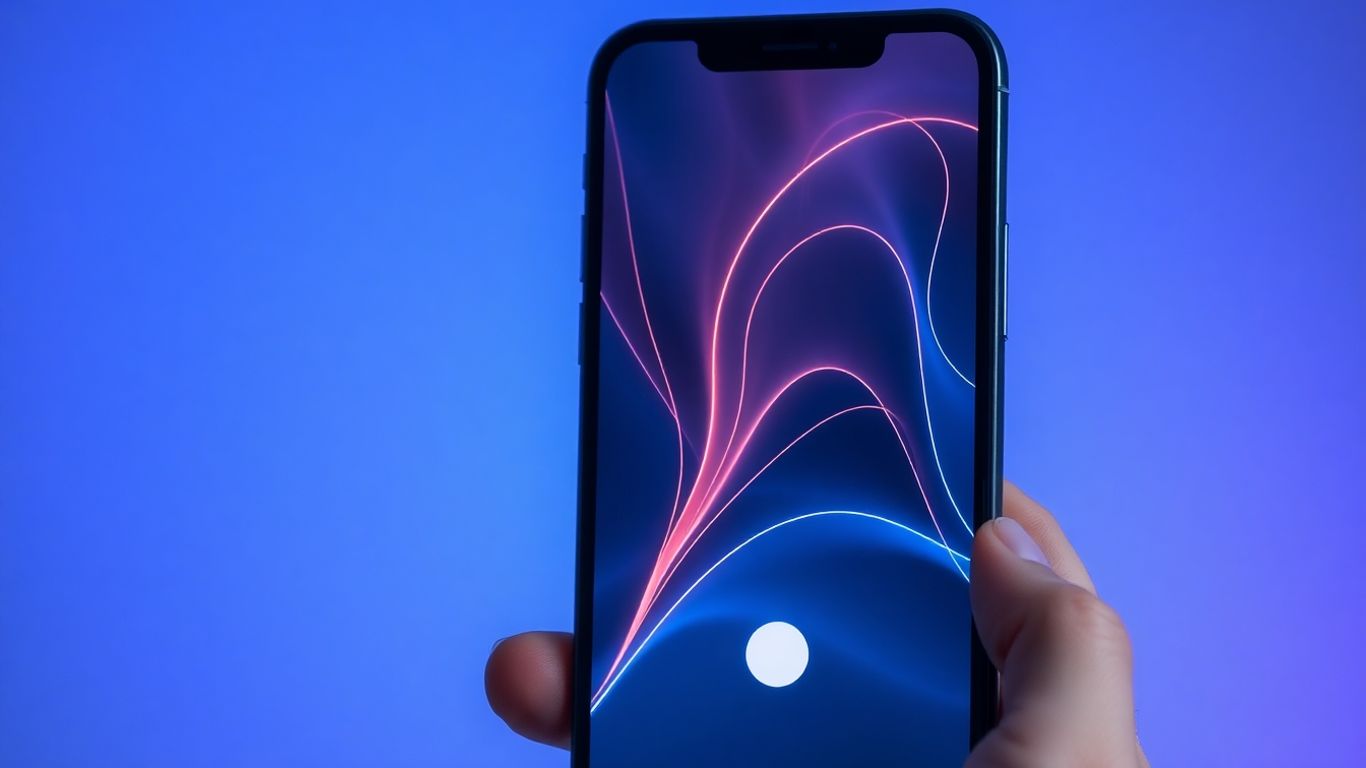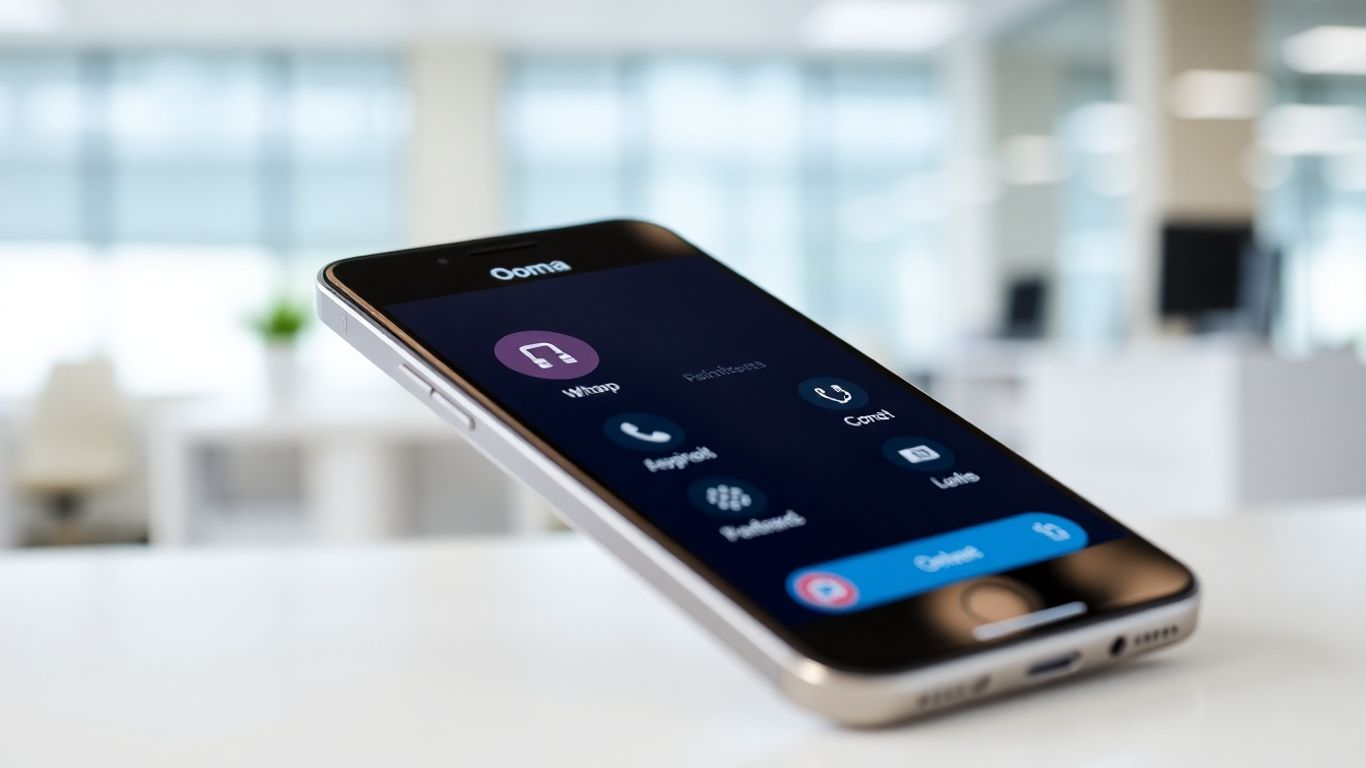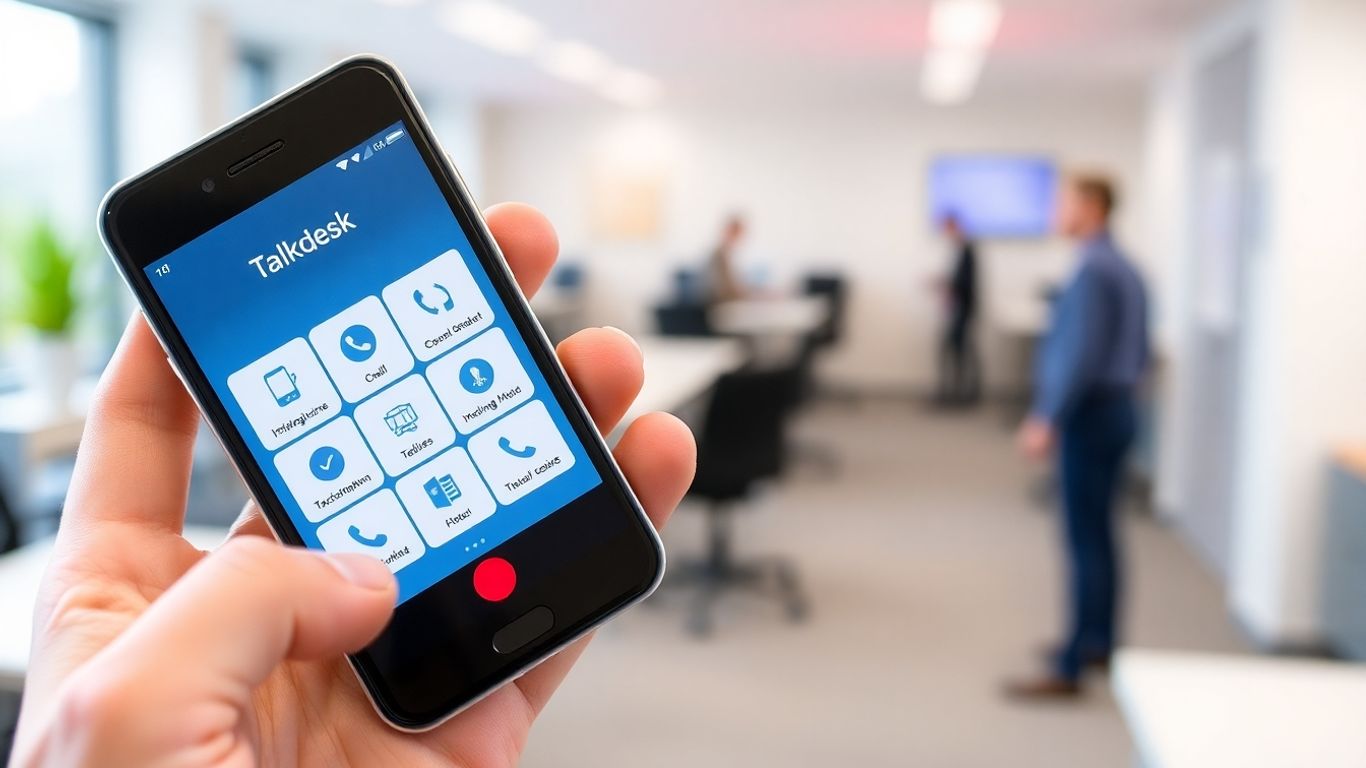Trying to keep up with every phone call can feel like a full-time job, right? Especially when you're running a business. That's where a good cell phone auto attendant app comes in. These apps act like your virtual receptionist, handling calls so you don't have to. We looked at some of the top options out there to see which ones really make managing your calls easier. Let's check them out.

My AI Front Desk is pretty interesting because it acts like a real receptionist, but it's powered by AI. It's designed to handle your business calls 24/7, answering questions, scheduling appointments, and even responding via text. This means you don't have to worry about missing calls when you're busy or after hours. It's like having an extra team member who never sleeps.
Setting it up seems straightforward. You basically tell the AI about your business, and it's ready to go. They even say it takes less than five minutes to get started. For small businesses, this could be a huge time-saver, letting you focus on other things instead of being tied to the phone. They also have options for larger call centers that need to manage a lot of incoming calls.
One of the standout features is its ability to handle complex questions. It uses advanced AI and references the information you give it to answer callers accurately. Plus, it's really fast, responding in milliseconds, so conversations feel natural, not robotic. This speed is a big deal because nobody likes waiting for a slow response.
Here's a quick look at what it can do:
The system's ability to integrate with existing tools is a major plus. It means your AI receptionist can become a central part of your business operations, updating CRMs, creating tasks, and notifying your team without any manual input. It really helps keep everything in sync.
They offer a free 7-day trial, which is a good way to see if it fits your needs. It's definitely a tool worth checking out if you're looking to improve your call management and customer service without hiring more staff. You can even try out their AI receptionist for free.
3CX is a pretty solid option if you're looking for a phone system that can handle your auto attendant needs. It's basically software that you can install either on your own servers or run in the cloud, giving you a lot of flexibility. What's cool about 3CX is how it handles calls. It's got this multi-level IVR, which is fancy talk for being able to set up different menus and options for callers. So, someone calls in, they can press '1' for sales, '2' for support, and then maybe '1' again for a specific product line. It really helps direct people without you having to manually route every single call.
One of the big pluses here is its integration capabilities. It plays nice with a bunch of different CRM systems, which means when a call comes in, the system can potentially pull up customer info automatically. That's a huge time-saver and makes the customer feel like you know who they are right away. Plus, it can route calls based on the time of day or even if it's a holiday, so you're not getting calls at 3 AM unless you want to be. You can also set up custom greetings, so your business sounds professional right from the first ring.
Setting up a good auto attendant isn't just about directing calls; it's about making a good first impression. With 3CX, you can create a system that feels custom-built for your business, guiding callers efficiently and professionally.
Here's a quick look at some of its main features:
If you're a business that needs a flexible phone system with advanced call management features, 3CX is definitely worth checking out. It's a system that can grow with you, whether you're a small startup or a larger operation. You can even integrate it with tools like Microsoft Teams for a more unified communication setup. It's a robust platform that aims to simplify how you manage your incoming calls, making sure no one gets lost in the shuffle. For businesses looking to automate their customer interactions and improve efficiency, exploring options like this AI chatbot can also be beneficial for lead qualification and data enrichment.
Dialpad is a pretty solid option if you're looking for a unified communications platform that also handles your auto attendant needs. It's not just about making calls; it bundles in team chat and video meetings, which is nice if you want everything in one place. What really stands out with Dialpad, though, is its AI and analytics capabilities. They've got this drag-and-drop builder for your auto attendant, which makes setting up call flows way less of a headache than it could be. You can create different branches, route calls to specific people or departments, and even have it play recorded announcements.
One of the cool things they offer is AI call transcription. This means not only can you see what was said during live calls, but also what customers said when interacting with your auto attendant. That’s some seriously useful data for figuring out what’s working and what’s not. Plus, they offer business numbers from over 70 countries, which is a big plus if you do international business.
Here’s a quick look at some of its features:
While Dialpad's monthly price is a bit higher than some basic options, starting around $27 per user, the built-in AI and analytics tools can really justify the cost if you're looking to get deeper insights into your customer interactions and agent performance. It’s a good balance between features and price for businesses that want more than just a basic answering service.
RingCentral is a pretty solid option if you're looking for a phone system that does more than just answer calls. It comes with a really capable auto-attendant feature that lets you set up multilevel IVR menus. You can build these complex call trees using a drag-and-drop studio, which is nice because it makes it easier to route calls exactly where they need to go, whether that's to specific users or different departments.
One of the standout features for RingCentral is its global reach. If you need to have a local presence in different countries or want customers to see a familiar area code when they call you, RingCentral offers international phone numbers. This can be a big plus for businesses that operate internationally or want to attract customers from specific regions.
Beyond just the auto-attendant, RingCentral bundles in team collaboration tools like chat and video conferencing. So, if your team needs a unified platform for both external calls and internal communication, this could be a good fit. Each plan usually includes a business number and a toll-free number, often with a decent chunk of minutes included each month, which is helpful for encouraging inbound calls.
Here's a quick look at some of its capabilities:
While RingCentral is a bit pricier than some other options, starting around $30 per user per month, you get a lot of functionality. It's especially good for teams that will actually use the built-in chat and video features alongside the phone system. Just be aware that the SMS limits can be quite restrictive depending on your plan, which might be a concern if your business relies heavily on text messaging.
RingCentral really shines when you need a comprehensive communication hub. It's not just about the auto-attendant; it's about integrating that with your team's daily workflow, whether that's through calls, chats, or video meetings. The ability to build detailed call flows is a major advantage for managing inbound traffic efficiently.
Grasshopper is a solid choice if you're running a business that's mostly on the go and you need a virtual phone system to match. It's built for those mobile-first entrepreneurs and small teams who need to manage calls professionally without being tied to a desk.
What Grasshopper does well is provide the essentials for keeping your business communications organized. You get custom greetings so you can sound professional right from the start, call forwarding to make sure you don't miss anything important, and business texting, which is pretty much a must-have these days. Plus, it handles voicemail transcription, so you can read messages instead of listening to them, which is a nice time-saver.
Grasshopper isn't really built for those super complex, back-and-forth conversations. If a caller has a complicated question or needs more than just basic routing, you'll likely still need a human to step in. It's more about efficient message taking and routing than deep interaction.
It's a good option if you need a professional phone presence and basic call management without a lot of fuss. Think of it as your virtual receptionist that handles the basics so you can focus on your actual work.

Ooma offers a pretty solid cloud-based phone system that's good for small to medium-sized businesses. Their auto attendant feature is part of what makes it work well for managing calls without needing a full-time receptionist. It's not overly complicated to get going, which is a big plus for businesses that don't have a dedicated IT person.
What you get with Ooma's auto attendant includes:
It's a straightforward system that aims to give businesses a professional phone presence without a huge price tag. If you're looking for something reliable that handles the basics of call management well, Ooma is definitely worth a look.
Ooma's approach seems to be about making business communication tools accessible and easy to use. They focus on providing the core features that most small to medium businesses need to sound professional and manage calls efficiently, without overwhelming users with too many complex options.
Aircall is a pretty solid option if you're looking for a business phone system that handles both inbound customer service and outbound sales calls. It's got this auto attendant feature that's actually quite nice to work with. You can design your call flow using a drag-and-drop tool, which makes setting up things like queues and different voice menu options feel less like a chore.
What really stands out with Aircall is its call routing capabilities. It goes beyond just basic routing; you can set it up to send calls to agents based on their skills or even the language they speak. For teams that deal with a lot of international customers or have specialized support staff, this is a big deal. Plus, their desktop app is clean and modern, which makes all those advanced features feel a bit more approachable.
Here's a quick look at some of its features:
Now, Aircall isn't the cheapest option out there. You need at least three licenses to even get started, and some of the really advanced features are locked behind their higher-tier plans. So, while it's a powerful tool, especially for inbound customer support and managing call queues, you'll likely be paying a bit more for the full experience.
Aircall's strength lies in its ability to handle complex call routing and queue management, making it a good fit for businesses that need more than just a basic auto attendant. The user interface is a plus, making it easier to manage these advanced features. Just be prepared for the price point, as it leans towards the higher end of the market.
Quo is a VoIP system that really shines when it comes to flexibility with phone numbers. It lets you share numbers between multiple staff members, so everyone can make calls and send texts from the same company number. This keeps your caller ID consistent, which is pretty neat. On the flip side, if you're the one juggling a lot of different lines, agents can easily switch between multiple numbers with just a click. Each number comes with its own inbox, so you can keep track of all calls and texts that need a response.
One of the standout features for me is the unlimited texting across the U.S. You don't have to constantly watch a monthly limit, which is a huge relief for businesses that rely on SMS.
While the basic auto attendant features like ring groups and multi-level IVR are there, Quo's real strength lies in how it lets you customize your call handling.
Here's a quick look at what Quo offers:
Quo's Starter plan is decent, but if you really want to get the most out of its number flexibility and features, I'd suggest looking at their Business plan. It's a bit more per user, but for teams that handle multiple roles or call queues, that flexibility is probably worth the extra cost.
Quo's approach to number sharing and management is a bit different from other systems. It's designed for teams where individuals might be handling different aspects of communication or representing different lines of business, all from a shared or easily switchable set of numbers. This can simplify things for customers and agents alike, provided your team is organized enough to manage it effectively.

Talkdesk really stands out because it's not just a phone system; it's a full-blown contact center. This means you can handle customer interactions not only through calls but also via SMS, social media, live chat, and email. It's designed to manage all these channels from one place, which can be a big deal for keeping things organized.
One of the neatest parts is its drag-and-drop builder. You can use this to set up your auto attendant flows, or even create live chatbots. It lets you build pretty complex systems for routing calls, using things like ring groups and call queues. You can even link these to custom task assignments that pull information from your CRM, which is pretty smart.
Talkdesk is a solid choice if you're looking to offer a wide range of communication options to your customers.
Here's a quick look at what it offers:
However, it's worth noting that Talkdesk comes with a higher price tag compared to simpler auto attendant apps. The sheer number of features and channels might be more than what some businesses need if they're just looking for basic call management. It's definitely geared towards companies that want a comprehensive contact center solution.
Setting up Talkdesk might take a bit more time than simpler apps, especially if you want to use all its advanced features. But for businesses that need to manage a lot of different customer communication channels, the investment in learning and setup can pay off in better organization and customer service.

Twilio Studio is a bit different from the other apps we've looked at. Instead of being a ready-to-go auto attendant app, it's more of a toolkit. Think of it like building with LEGOs – you get all the pieces, and you can build pretty much anything you want, but you have to do the building yourself.
It's a visual builder where you drag and drop different 'widgets' to create your call flows. You can connect phone numbers, set up call queues, and even build out SMS surveys. The big draw here is the flexibility. If you have a really specific need or want to integrate your auto attendant with other custom software you're using, Twilio Studio can probably do it. It's designed to work with Twilio's other services, like their voice and messaging APIs, so you can really get fancy with it.
However, this flexibility comes with a catch. Because it's not a pre-built app, you'll likely need someone with some programming knowledge to get it set up and running smoothly, especially if you're trying to connect it to your existing systems. It's not really a 'plug and play' kind of deal. The pricing can also be a little tricky to pin down. You pay for what you use – each call flow execution, each call, each message. So, while it might seem cheap to start, it can add up depending on your usage.
Here's a quick rundown of what you get:
While Twilio Studio offers unparalleled customization, it's best suited for businesses with the technical resources to build and maintain their own call flows. If you're looking for a simple, out-of-the-box solution, this might be more than you need. But if you want to craft a truly unique and integrated communication experience, Twilio Studio is a powerful option.
The main selling point of Twilio Studio is its sheer customizability, allowing you to build complex and integrated voice and SMS experiences. It's a great choice if you have specific technical requirements and the in-house expertise to match.
Twilio Studio is a cool tool that lets you build phone call and text message experiences without needing to be a coding expert. You can create automated phone menus, send out text message campaigns, and even build your own AI receptionist. It's like having a digital assistant for your communications. Want to see how it can help your business? Visit our website to learn more!
So, we've looked at a bunch of ways to make your phone calls work better for your business. It's clear that just having a phone line isn't enough anymore. An auto attendant app can really change how you handle things, making sure you don't miss out on leads or important customer chats. Whether you need something super simple or a system that talks to all your other software, there's an option out there. Picking the right one means thinking about what you actually need and what fits your budget. But honestly, getting a good auto attendant is a smart move for almost any business trying to stay on top of things.
Think of an AI receptionist as a super-smart virtual assistant for your phone. It can answer common questions your customers might have, set up appointments, and even send texts, all without a human needing to do it. It's available 24/7, so you never miss a chance to connect with a customer, and it works way faster than a person could!
Getting started is usually super fast! Many services let you set up your AI receptionist in just a few minutes. You typically just need to tell it a bit about your business, make a payment, and then you can start sending your calls its way.
Yes, the best ones use advanced AI that can understand and answer tricky questions about your business. They learn from the information you give them, sort of like how you'd teach a new employee. The goal is for it to sound natural and helpful, not like a robot reading a script.
Good systems are designed to handle this. They can be set up to forward calls to a live person, take a message, or offer other options if they can't resolve the issue. It's all about making sure the caller gets the help they need without getting stuck.
Absolutely! Many of these apps are built to connect with other popular tools you might already use, like your calendar for scheduling or your CRM to keep track of customers. This makes managing your business much smoother because everything is linked together.
Yes, you can often set limits on how many minutes your AI receptionist is active. This is great for controlling costs. You can set daily, weekly, or monthly limits and get alerted when you're getting close to them. It helps you manage your budget and make sure the AI is available when you need it most.
Many services offer a free trial period, often for about 7 days. This is a fantastic way to test out the features and see if it’s a good fit for your business before you decide to pay for it.
The cost can vary a lot depending on the features and how much you use it. Some services charge per minute or per call, while others have a flat monthly fee. It's important to look at your typical call volume and the features you need to find the most cost-effective option for your business.
Start your free trial for My AI Front Desk today, it takes minutes to setup!








